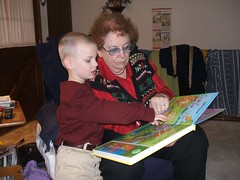Here’s a great idea from Marylaine Block’s weekly e-zine (#299, 22 June 2007). In her newsletter article today, Knowledge Pushers, Marylaine says that libraries are more than books. She cites the value of the knowledge of librarians. She says:
We know how to get grants, how to track our ancestors, how to digitize precious historical and family photos, and how to entice children to read. We know how to find trustworthy factual information on political candidates and important public issues. We’ve done the research and can tell anxious parents about the capabilities and limitations of various internet filters; we can also suggest other ways to keep kids safe as they explore the net.
She suggests that the reason the public doesn’t know is that we don’t tell them, that libraries wait for people to come to us, when we could go out to the community. Marylaine says that as the director goes out (I hope that’s so, but I fear too many times it’s not), so could other library staff.
All this reminded me of Rochesterfest — where I’ve found wonderful food the last couple of days (why cook?). At Rochesterfest, there is a row of food stands, run by our great local restaurants. People who go to the festival find great food from vendors whose restaurants they may never have thought to try.
So, just like the restaurateur, who comes to meet new customers where they are, the library will bring valuable information to people where they are through the library speakers’ bureau.
While I don’t work in a library that provides direct service to end users, I do get the chance to speak to groups (as do most of the librarians I work with) – and really get charged up when I invited to do so. I’ve spoken to church libraries, Rotary, groups of teachers and librarians, led a book discussion for a tea, and am looking forward to this fall when among other meetings I’ll be doing a presentation for the Friends of the Mabel Public Library.


